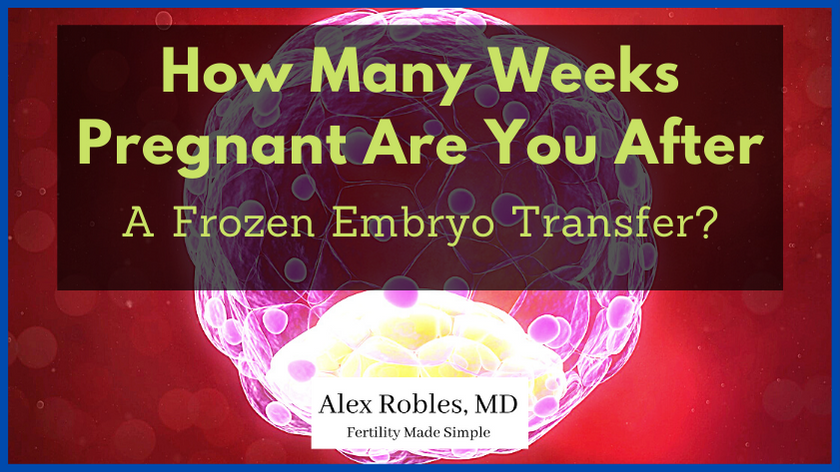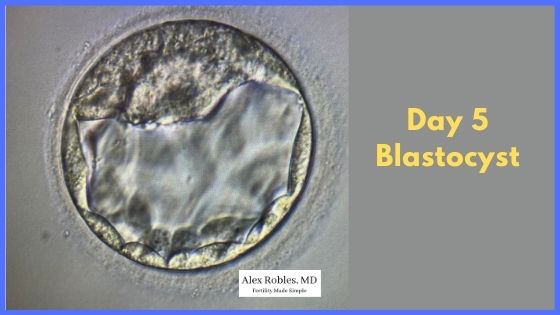Did you have a frozen embryo transfer?
How many weeks pregnant are you after the transfer?
When do you check a pregnancy test, and how far along are you at that point?
In this post, you will get answers to all of these questions and more.
Let’s get started.

How many weeks pregnant are you after a frozen embryo transfer?
You are approximately 2 weeks and 5 days pregnant on the day of a blastocyst embryo transfer.
After a day 3 embryo transfer, you are approximately 2 weeks and 3 days.
It seems counterintuitive, but we date pregnancies from the first day of your last menstrual period, not the time of conception. In other words, the egg (and the potential pregnancy) is approximately 2 weeks old by the time you ovulate.
With that said, the transfer does not guarantee that you will become pregnant. You won’t know if the embryo implantation is successful until you have a positive pregnancy test.
When do you check a pregnancy test after IVF frozen embryo transfer?
A blood pregnancy test is typically done 10-14 days after a frozen embryo transfer.
If positive, we will closely check your beta hCG (human chorionic gonadotropin) levels to ensure that they are rising appropriately. Ideally, the beta hCG levels should double every two days.
Why do you have to wait two weeks after embryo transfer for a pregnancy test?
You have to wait two weeks after an embryo transfer to check a pregnancy test because it takes time for the embryo to implant in the uterus and start producing beta-hCG.
If you check a home pregnancy test too soon, you might get a false-negative result. Also, at-home urine pregnancy tests are not as sensitive as a blood test done at a doctor’s office, so they might not pick up a low level of hCG.
Most fertility specialists will wait 9-10 days before checking your hCG level to avoid false-negative results.
However, your fertility clinic might wait the full 14 days (the 2-week wait).
When does the embryo implant, and how old is it when implanted?
The embryo begins to implant into the uterine wall in the first 24-48 hours after the transfer. The entire process is completed by the fifth day after the transfer.
At the time of implantation, the embryo is about 3 weeks and 3 days.
What are the next steps?
If your beta-hCG is rising appropriately, we will schedule you for your first ultrasound to confirm the presence of a gestational sac inside the uterus.
The earliest you can see a gestational sac on a vaginal ultrasound is at approximately 5 weeks gestation.
How many weeks pregnant are you two weeks after the embryo transfer?
If you had a day 5 blastocyst transfer, you are approximately 4 weeks and 5 days at the two-week mark.
Similarly, you are approximately 4 weeks and 3 days after a Day 3 embryo transfer at the two-week mark.

How do you calculate your due date after a frozen embryo transfer?
You can use the following formulas to calculate your estimated due date after an embryo transfer.
Day 5 Embryo Transfer
- Transfer date + 266 days – 5 days
Day 3 Embryo Transfer
- Transfer date + 266 days – 3 days
How do I calculate pregnancy weeks or gestational age after IVF?
You always date your IVF pregnancy from the day of your transfer and the type of embryo you had transferred. If you had a day 5 embryo transfer today, you are 2 weeks and 5 days.
To calculate the number of weeks pregnant you are, count the number of weeks from your transfer date to the current date.
Other Related Questions
How many weeks after your period does the frozen embryo transfer occur?
A frozen embryo transfer is usually done 2-3 weeks after the start of your menstrual cycle. I have an entire post on the frozen embryo transfer timeline broken down day by day.
I also show you what to expect if you have a medicated frozen embryo transfer or a natural frozen embryo transfer cycle.
Is your dating different with fresh embryos compared to frozen embryos?
No, your IVF pregnancy is always dated by the date of the embryo transfer procedure and the age of the embryo used (Day 5 vs. Day 6 vs. Day 7 vs. Day 3).
However, IVF patients are dated differently from pregnant women who had a natural conception. Your delivery date is typically calculated based on your last menstrual period in natural pregnancies.
Either way, a due date calculation is just an estimate, so don’t worry about trying to get an exact date.
When does a fresh embryo transfer occur?
A fresh embryo transfer typically happens five days after the egg retrieval procedure. However, most providers will allow a fresh transfer only if:
- You do not have signs of ovarian hyperstimulation syndrome (OHSS)
- Your estrogen levels are not excessively high (a common risk factor for OHSS)
- Your progesterone levels are not elevated
- The lining of the uterus is ~7 mm
- At least one of your embryos has made it to the blastocyst stage on Day 5
If there is an abnormality in one of these parameters, your provider will recommend that you freeze your embryos instead.
How old is a day 5 embryo?
A day 5 embryo is 2 weeks and 5 days. The great thing about a Day 5 embryo is that it can be frozen at this stage and remain at that gestational age indefinitely.
A frozen embryo can be thawed for future use at any point.
What other fertility treatment do you need after an FET?
There are two types of FET cycles: a medicated cycle and a natural cycle.
If you had a medicated frozen embryo transfer, you would need supplemental progesterone. Most providers use progesterone in oil injections, but you might also be able to use progesterone suppositories.
If you had a natural cycle, you may or may not need any progesterone.
Is there anything else I should know about?
A positive pregnancy test confirms that the embryo has implanted, but it does not guarantee a healthy pregnancy.
It is important that we follow your hCG hormone level closely as inappropriate rises could indicate:
If you develop any unusual symptoms such as severe pain, feeling faint, or palpitations, speak with your doctor immediately.
What are normal pregnancy symptoms?
If the embryo implants successfully, you may begin to experience early pregnancy symptoms over the next few weeks.
Possible symptoms include:
- Mild cramping
- Nausea
- Fatigue
- Light bleeding or spotting
Final Words On Dating Your Pregnancy After In Vitro Fertilization
In conclusion, you date your pregnancy from the day of embryo transfer and how far along the embryo is, not the day of conception.
This dating holds true whether you do a frozen transfer or a fresh embryo transfer following a fresh IVF cycle.
Either way, it can take approximately two weeks for b-hCG to become detectable in your blood or urine.
What other questions do you have about the IVF process? Comment below.
Related Posts:
- Frozen Embryo Transfer Success Rates (Advantages & Disadvantages)
- Early Pregnancy Testing: When To Do It & Why
- Ectopic Pregnancy After IVF: What To Look Out For
Make An Appointment With Dr. Robles To Discuss Your Fertility Options Today!

Alex Robles, MD
Dr. Alex Robles is a Spanish-speaking Latino-American Reproductive Endocrinologist and Infertility specialist in New York City, and a board-certified OBGYN. He has a special interest in health, lifestyle, & nutrition. Make an appointment with Dr. Robles to discuss your fertility options today!
